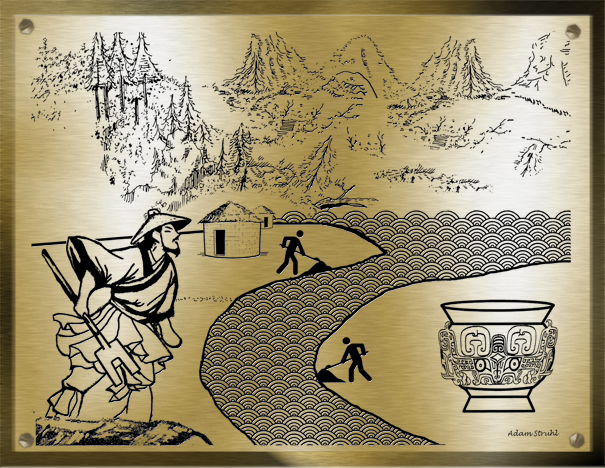| Time Period | Myth (Around 2150 BCE) |
| Geographical Region | Sichuan |
| List of Symbols |
|
The depiction of the Sichuan River Valley in the background of the plaque represents where the creators of this plaque came from. As this era of prehistory precedes the creation of the concepts of maps by a significant margin, the people of this time would likely included a visual record so that when people looking at their tablet would be able to understand where the people and events depicted came from. One significant part of the mountain-scape depicted in this tablet is Mount Wen, the birthplace of Yu the Great, who is depicted in the bottom left of the tablet.
Yu the Great is a significant figure in Chinese mythology as the last of the Three Sage Kings, being the successor to Shun, who was the successor of Yao. Yu is also remembered as the founder of China’s first dynasty, the Xia. Because of these distinctions, the depiction of Yu in this picture features him standing atop a rock and surveying the entirety of the tablet. This gives him an air of significance, as his size and pose allow people to understand that he is an important person at a glance.
The item that Yu is holding in his hand is an ancient Chinese spade, which represents the part that he played in the taming of the rivers. According to legends, during the Yu’s lifetime the lands of China were being devastated by a catastrophic flood. The Sage King Yao had tasked Yu’s father Gun with the task of suppressing the floods, but despite his mighty efforts, Gun was unable to make any significant progress. As a result of his lack of results Shun, then an official serving under Yao, ordered that Gun be thrown into prison for his incompetence and tasked Yu with the job that his father had been unable to finish.
This labor is depicted in the center of the tablet, where multiple workers are seen digging a canal to redirect the water around a small village. This is representative of the alternative method that Yu the Great used to tame the flood, as at that time the traditional way of dealing with floods at the was to build dikes and dams. However, due to the extremely severe nature of the floods at the time, any attempt to simply block the flow of the water was simply overwhelmed any attempt to restrict its flow. So instead of attempting to oppose the natural flow of the water, Yu had his workers dig a series of canals that would redirect the flow of the water away from the villages and back into the ocean. He also redirected some of the river current away into the fields, allowing for easy irrigation. Yu’s efforts resulted in the rechanneling of many of China’s major rivers, including the Yellow River and the Wei River.
The Bronze Vessel in the bottom right corner of the tablet is also important to this tablet, as it serves as a way of dating the time period of the events that are depicted in this tablet. The Chinese were developing the capability to use bronze somewhere around 2100 BCE, resulting in China’s Bronze Age in the 2000’s BCE. Prior to this all that existed were stone and wood tools, so the presence of a crude, primitive bronze vessel in this tablet would be a crucial factor in dating the tablet. The bronze itself would indicate that the carving was made some time after 2200 BCE, but at the same time the undeveloped nature of the vessel would also indicate that it had to have been from the very beginning of bronze casting. This would allow historians to date Yu’s great accomplishment some time near 2150 BCE, as it would be late enough for the technology to produce bronze vessels to exist, but early enough for the vessel to lack the quality and beauty possessed by Shang and Zhou era bronze.
ADAM STRUHL is currently a sophmore intent on double-majoring in Digital Media Studies and Creative Writing. His hobbies include reading fantasy novels and doing freelance graphics work. He likes using chopsticks to eat snacks so his fingers don’t get greasy. More by Adam

